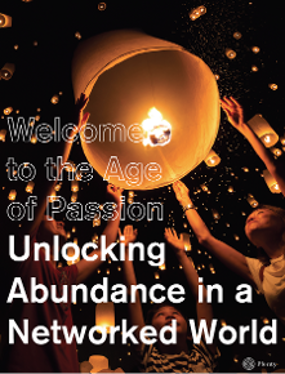The Best Advice You’ve Probably Forgotten: Post #2
We love to reminisce. Whether taking a trip down memory lane with old friends over beers, or posting a #TBT (Throwback Thursday) post of last year’s Halloween costume on social media, there’s nothing like a “blast from the past” to brighten the day. In that spirit, let’s hop in the not-so-way-back machine and revisit the best piece of fundraising advice you’ve probably forgotten, volume two.
A lot has changed in one year of fundraising. Whether it’s the Ice Bucket Challenge campaign’s 2014 success and 2015's (comparative) flop, the Planned Parenthood PR scandal, or the continued success of #GivingTuesday, old questions have been answered and new questions have been asked.
Millennials fall somewhere in between.
As we said last year, the conversation around millennials isn’t a new one in the nonprofit space. That said, best practices for millennial engagement haven’t been solidified, in part because of the shifting winds of public opinion about millennial potential and in part because millennials aren’t the focus of many fundraising campaigns.
To help you solve the puzzle of millennial engagement, here’s the best piece of millennial fundraising advice you’ve probably forgotten.
Post #2: Three Ways To Engage The Next Generation Of Fundraisers
It’s safe to say that millennials are the most misunderstood generation to date. The question is still – what opportunities are being missed by nonprofit organizations that don’t seek to correct these misconceptions? We can begin uncovering the answer by adjusting how we view millennials. We need to think of millennials in a different light. To put it simply, it’s time to stop asking, “What are millennials?” and begin asking, “Who are millennials?”
Here are the three things you need to understand about this generation:
1. Millennials have more to offer your organization than money.
Yes, college costs continue to rise and student debt is a harsh reality, but ominous headlines aside, millennials still give. In fact 84% donated to a nonprofit in 2014.
And even millennials who truly lack the funds to donate are still flush with other resources – time, skills and social networks. Don’t let these reservoirs go untapped. Ask millennials to donate their time, talents and leverage their networks for your cause. Trust them to take ownership of their involvement. Recruit them for a Young Professional Board. An engaged corps of younger volunteers today will yield dividends tomorrow.
2. Millennials have finely tuned authenticity radars.It is impossible to replicate, manufacture, or argue authenticity. The Ice Bucket Challenge was a one-of-a-kind, grassroots, peer-to-peer phenomenon – imitation Ice Buckets floundered because they are, by definition, contrived. Similarly, the 2015 follow up to the viral sensation didn’t arise organically from the field’s demand for a second go at getting wet; rather, it was coordinated by the organization and disseminated to the field. For that reason, among others, the second annual IBC is slated to hit less than $1 million, a comparative flop.
Millennials appreciate genuine communications, which can be achieved by doing the following:
-
Speak the millennial language. Avoid industry jargon and wordy communications. Don’t be afraid of white space. Dare to be bold, funny and different in your communications.
-
Tell one story. Pictures and videos create memories, so use them to show the transformative power of donations, time and money. Communicate a clear mission and tangible outcomes.
-
Let the network work for you. Inspire a few well-connected individuals and let them communicate your mission to trusting peers. Your most creative campaigns are no competition for the original words of a friend or colleague
First, a word on Facebook. The social media giant has reigned supreme among social networks for a decade, and despite last year’s reports that popularity is waning among millennials, it is still the most popular social media site among all millennials. 87% of men and 91% of women ages 20-35 have a Facebook account, and it is used more frequently than either Twitter, Instagram, Snapchat, or Pinterest.
Now, when considering social media applications and millennial popularity, it’s easy to paint millennials with one sweeping, click-happy brush. Before you create a Snapchat account to reach your 20-35 year old donor base, however, take a moment to consider how and why a 17 year old uses social media, compared to a 35 year old professional.
The differing priorities, activities, and interests of a high school student and a college graduate should influence not only your social media strategy, but also your campaign’s target demographic. Once you’ve decided whether or not you’re targeting young millennials (as organizations like DoSomething.org often do with great success), or the older faction, then you can make informed decisions about which applications to explore. Snapchat and SMS campaigns are good bets for millennials under twenty, while Facebook, Instagram, and Twitter are hubs for the 20-35 demographic.
Different strokes for different folks.
The most criticized, misunderstood and underestimated generation can (and should!) become your biggest fundraising ally with the right approach. Galvanizing millennial support for your next peer-to-peer campaign requires neither a miracle nor a re-creation of the blockbuster campaigns of yesteryear. Simple, honest, mission-driven campaigns will resonate with a generation eager to roll up their sleeves for social good.
Millennials aren't the only group demanding authentic and human interactions with nonprofits. Discover the changing landscape of philanthropy and step into the Age of Passion in which authenticity, boldness, and heart are the new drivers of success.
Download your free copy below!
Share this
You May Also Like
These Related Stories

Three Ways To Engage The Next Generation Of Fundraisers

How To Build A Strong Peer-to-Peer Fundraising Strategy In 2015




No Comments Yet
Let us know what you think